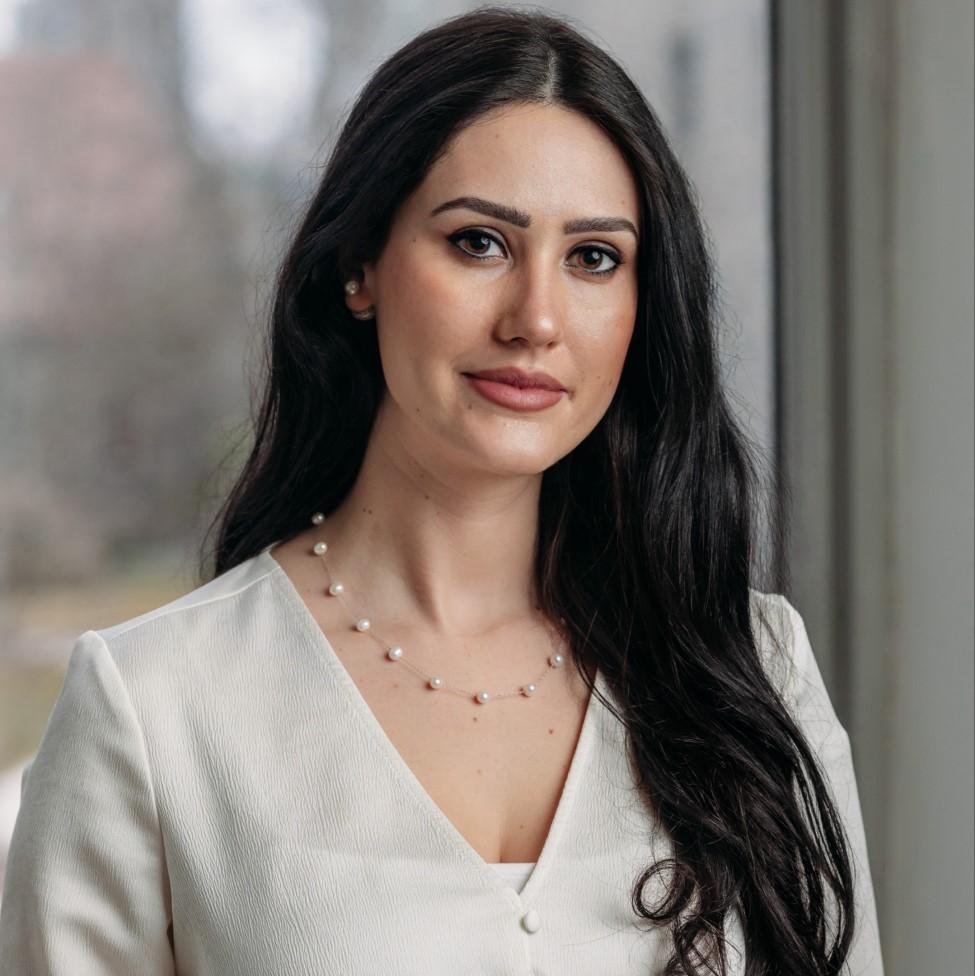
Haub Law Student Remila Jasharllari Selected by the Westchester Women’s Bar Association Foundation Scholarship to Receive the Justice Sondra M. Miller Scholarship
The Westchester Women's Bar Association Foundation (WWBAF) has awarded the Justice Sondra M. Miller Scholarship in honor of WWBA founding member and past President Hon. Sondra M. Miller to Haub Law student Remila Jasharllari. The WWBAF evaluates scholarship applicants on a number of criteria: community and/or public service, clinic and internship involvement, life balance, academic record, personal adversity in pursuit of a legal education and intent to make future contributions to Westchester County.
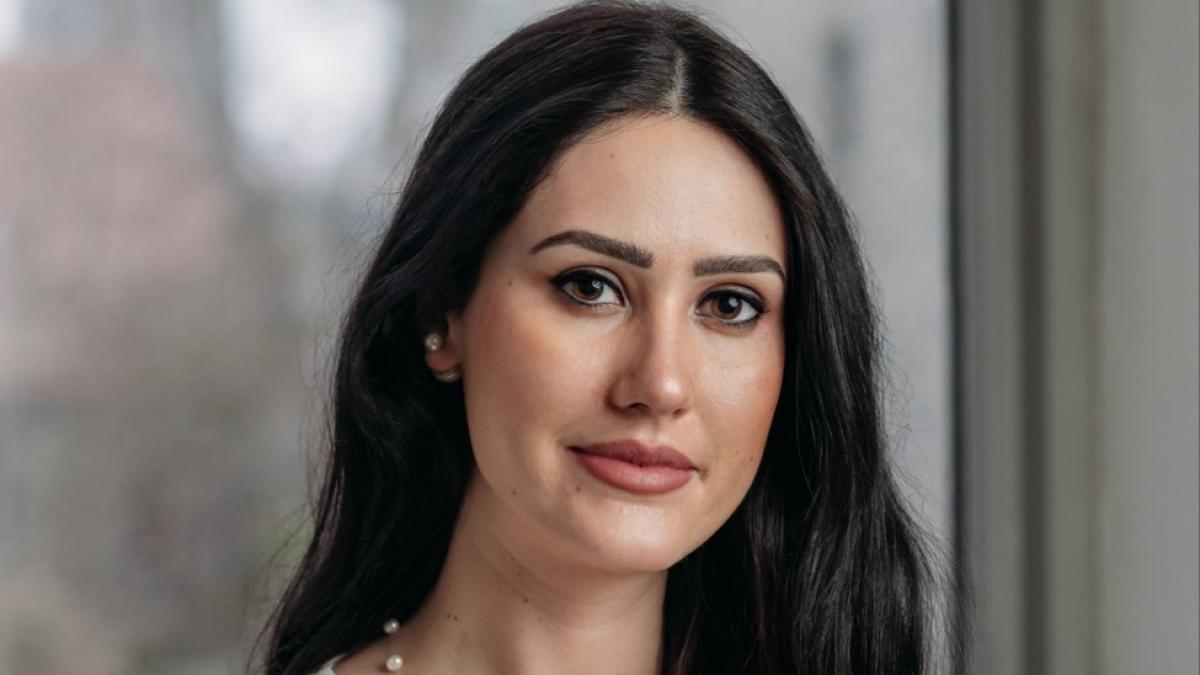

The Westchester Women's Bar Association Foundation (WWBAF) has awarded the Justice Sondra M. Miller Scholarship in honor of WWBA founding member and past President Hon. Sondra M. Miller to Haub Law student Remila Jasharllari. The WWBAF evaluates scholarship applicants on a number of criteria: community and/or public service, clinic and internship involvement, life balance, academic record, personal adversity in pursuit of a legal education and intent to make future contributions to Westchester County.
“This year, the Foundation Board was tasked with selecting a 2024 recipient of this prestigious award from fourteen well-qualified applicants,” said Susan Corcoran, President of the WWBAF. “It was, as always, a difficult decision. Our goal is to identify a deserving recipient whose future in the law carries on the ideals of its namesake, Judge Miller.”
“As an 18-year-old immigrant to the US who arrived here ‘completely on my own’, Remila’s journey to law school is inspirational,” said Susan Corcoran. “Remila’s journey inspired her to help other law students to excel academically. In her own words, ‘I started law school seeking to improve myself and to help carve a path toward success for those who feel, like I once did, lost or excluded.’ Becoming a trail blazer starts at a young age with a willingness to jump into the unknown; whether it is Judge Miller who took the leap to become one of the first women admitted to Harvard Law School or Remila Jasharllari who took the leap to journey to the US (again, in her own words) ‘… to learn, contribute and succeed.’ The WWBAF could not ask for a more perfect candidate to represent the values and pioneering spirit of our own Justice Sondra Miller.”
Remila Jasharllari described being selected for the prestigious Justice Sondra M. Miller award as the utmost honor. “Justice Miller has a history of firsts throughout her extraordinary career- from being a member of Harvard Law School’s first class of admitted women to her historical appointment in the Second Department,” said Remila. “I had the pleasure of meeting her, and was moved by her unmatched wisdom, elegance, and kindness. I consider myself fortunate for connecting with so many brilliant judges and attorneys of the Westchester Women’s Bar Association, and I am inspired by their fortitude in navigating the legal profession, while upholding the ideals of justice, integrity, and inclusion. There is power in mentorship, and I look forward to fostering the ideals of the WWBA in my legal career and making an impact in the Westchester community and beyond.” This summer, Remila will be joining Arnold & Porter Kaye Scholer LLP as a 2024 Summer Associate.
"Risky": Legal Experts Say Supreme Court's Ballot Ruling "Could Lead To Another January 6"
Professor Gershman provided expert insight to Salon.com about the Supreme Court's decision that redirected the potential chaos surrounding efforts to remove Donald Trump from the ballot to Congress.
Should NYS Try To Protect Kids From Addictive Social Media? Supreme Court Case Looms
- Read more about Should NYS Try To Protect Kids From Addictive Social Media? Supreme Court Case Looms
Haub Professor Leslie Garfield Tenzer speaks to The Journal News about the New York bills in the state Legislature that would prevent social media platforms from providing minors under 18 with addictive feeds without parental consent that the Supreme Court could upend.
How We Can Fix The FAFSA Mess
President Marvin Krislov an op-ed in the New York Daily News, he writes about how we can fix the FAFSA mess for students — and the story gets picked up by Galaxy Concerns.
Scripps News: Professor Bennett L. Gershman on the Colorado's Ballot Disqualification Case
Haub Law Professor Bennett Gershman speaks to Scripps News about the Supreme Court’s ruling allowing Donald Trump to remain on Colorado’s presidential primary ballot.
Westchester County Honors 'Trailblazers' as part of Black History Month Celebration
Black Westchester Magazine reports Westchester County Executive George Latimer and Deputy County Executive Ken Jenkins honored Elisabeth Haub School of Law Dean Horace Anderson Jr. for his professional accomplishments and community efforts at the 2024 Trailblazers Awards Ceremony.
N.Y. Law For Polling Sites On Campuses Not Fully Implemented
Assistant Director for the Center for Community Action and Research Erin Mysogland speaks with Inside Higher Ed about a New York law mandating campus polling sites, however its implementation has proven slow and erratic. On a positive note, for the first time ever, Pace will serve as a polling place starting April 2 on the NYC campus (and one is in the works for Westchester).
How Important Is Texting in Dating?
Dyson Professor Leora Trub provides insights from her scholarly research to The New York Times relating to a story on modern dating, texting and communicating.
Dancing Through Algorithms: Transitioning from Dance to Tech
Lauren DeMaio is a senior at the Seidenberg School, who mixes the art of dance with the science of computing.
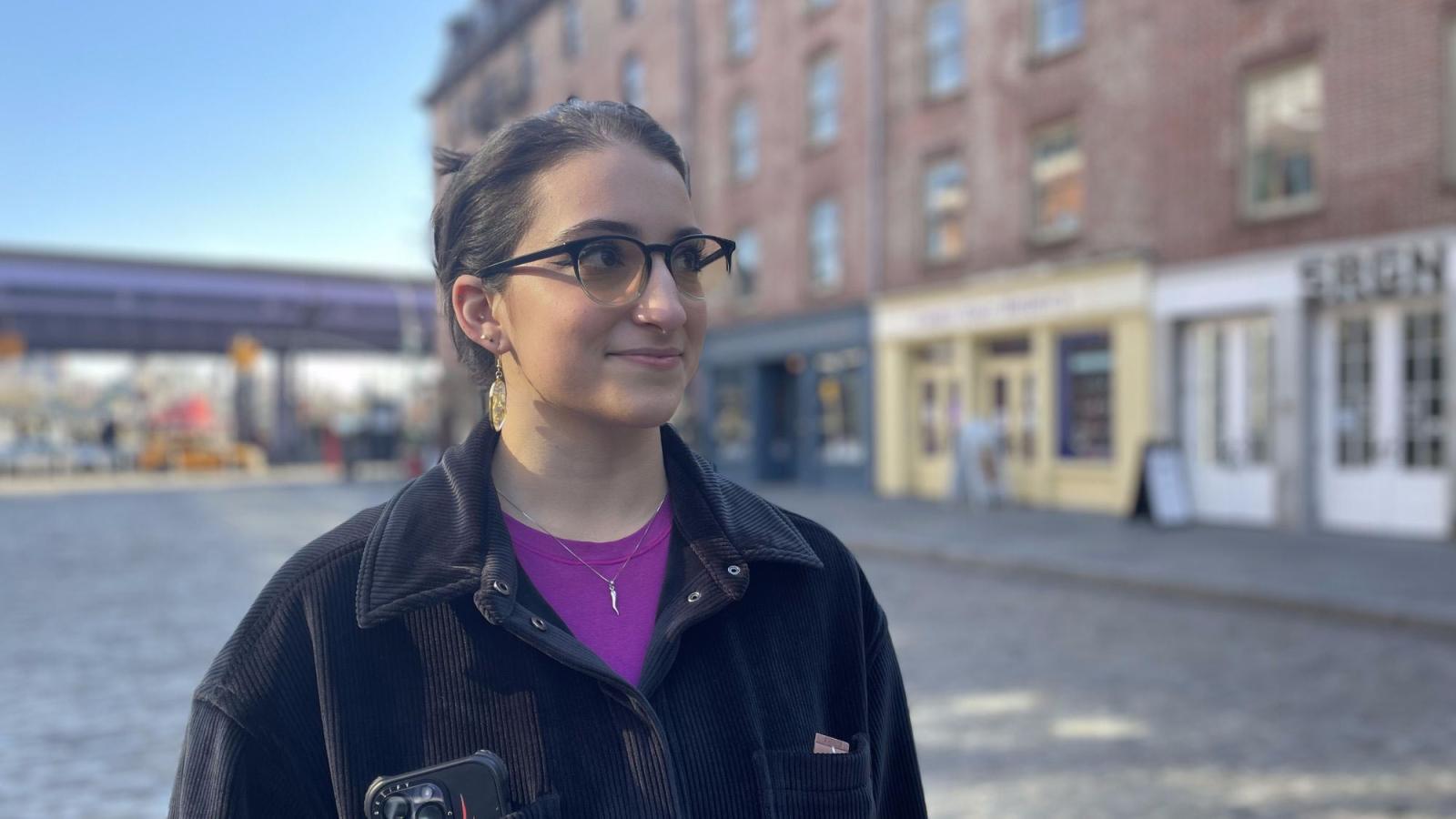
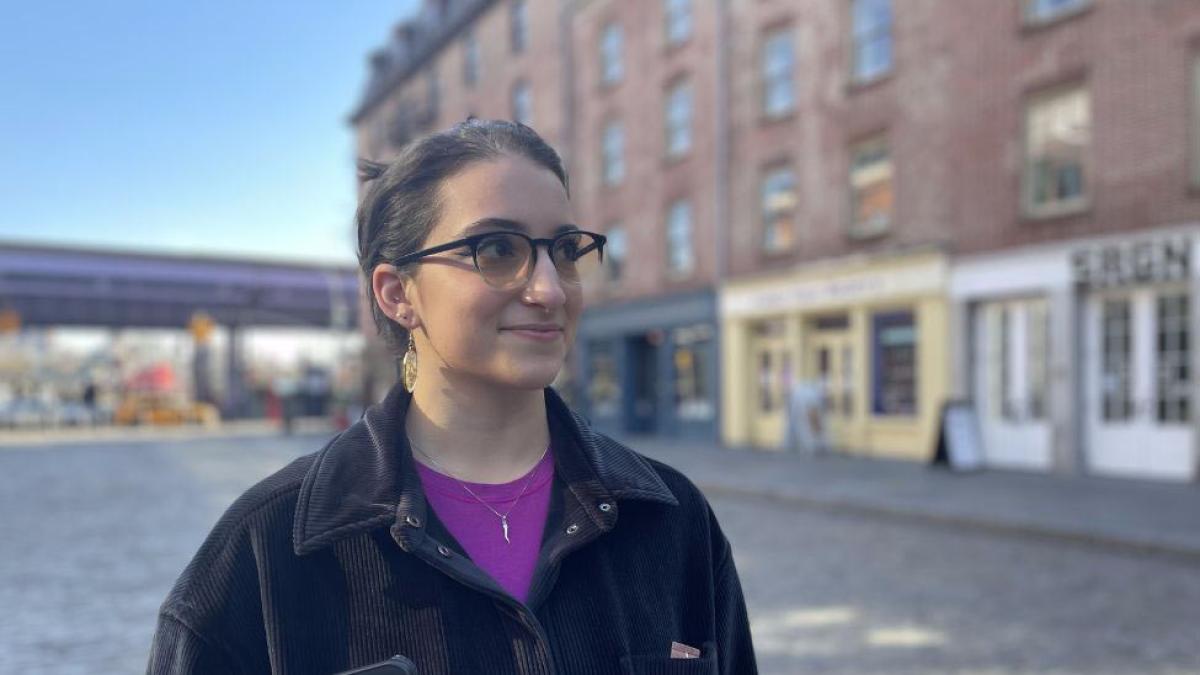
Lauren DeMaio (BS in Computer Science '24) is a senior at the Seidenberg School, who mixes the art of dance with the science of computing. Join us as we walk through Lauren's typical day on campus, her lattes, her algorithms, and the story of how her decisions have led to an adventure in learning and teaching, at Pace.
Lauren’s typical day begins with a brief stop at the Seidenberg building where she is greeted by fellow students and faculty collaborating on projects, doing homework, or simply catching up from the weekend. These interactions set the tone for Lauren’s day and are a reminder of the fun and collegial community she has found at Seidenberg.
Lauren’s path to Pace was a bit less traditional than some. During her senior year in high school, and driven by a passion for dance, Lauren decided to leave public school to attend the Joffrey Ballet School as a Jazz and Contemporary Trainee. “I was commuting each day from my home in Dutchess County to New York City,” noted Lauren. Though the dance program was supposed to be four years long, Lauren decided to apply to a handful of colleges. “I just wanted to keep all possible paths open for myself,” shared Lauren. “I had very little interest in most of the schools I applied to, but when I received my acceptance to Pace, I was so thrilled that I accepted the offer.” Lauren ended up deferring her acceptance for one year, as she continued her studies at Joffrey.
When the COVID pandemic hit, however, it inspired Lauren to re-evaluate her path. “I took a look at my deferral from Pace and just jumped,” advised Lauren.
Computer Science was the only major that ever spoke to me, so I just took that idea and ran with it. Here I am in my senior year of undergrad, and I could not be happier with the decisions I made, especially with choosing Pace.
Lauren has filled her time at Pace with more than just studies. She has been able to nurture her love for teaching (she previously taught dance) through being a Teaching Assistant, with Dr. Carmine Guida as her mentor. In this role, Lauren is able to transfer approaches she’s used in teaching dance to help students in CS 241 Data Structures & Algorithms and CS 321 Intro to Game Programming. “Breaking down abstract computer science topics is just like breaking down the mechanics of a tendu,” shares Lauren. “Seeing that spark moment for the student where they finally understand has just further fueled my love for teaching.”
In addition, Lauren participates in the Design Factory project. During the Fall 2023 semester, Lauren and her teammates, led by the Design Factory program director Dr. Andreea Cotoranu, focused on responsible consumption and production, and looked for opportunities to address them. As part of their journey, they travelled to CERN (The European Organization for Nuclear Research) in Geneva, Switzerland, and spent two weeks developing solutions alongside other schools from the Design Factory Network. Lauren’s team is currently in the prototyping phase of their project, expecting to finish it by the end of the Spring 2024 semester.
Everyone on the team is so welcoming and passionate about what they are studying. It is truly inspiring to be part of such an aspiring group of students.
Despite her busy schedule, Lauren finds time to socialize (and caffeinate) throughout the day. You can find her each morning grabbing a latte from Variety Coffee Roasters. She also takes the opportunity to enjoy an espresso when she visits Dr. Guida to discuss her research and the progress of students in CS 241 and CS 321. After class, Lauren and her friends often walk over to the McNally Jackson bookstore, with a quick stop at the Funny Face bakery, to get hot chocolate and browse new books.
Despite changing gears, Lauren continues to be influenced by her background in dance. “Dancers have this beautiful ability to create a welcoming space for others where self-expression and being fully oneself in the present is key,” offers Lauren. “Not to make it seem like a science, but there is a power that comes with having the ability to make people feel comfortable in any particular space.” Lauren tries to apply this openness and promotion of self in all her interactions. “Giving people the space to express their passions really helps me see people as they are, and I have dance to thank for the ability to do that.”
A Banner Week with More Impressive Wins for Haub Law’s Advocacy Program
The Elisabeth Haub School of Law at Pace University’s top ranked trial advocacy program continues its track record of success with even more top finishes amongst fierce competition over the last week and weekend in February.
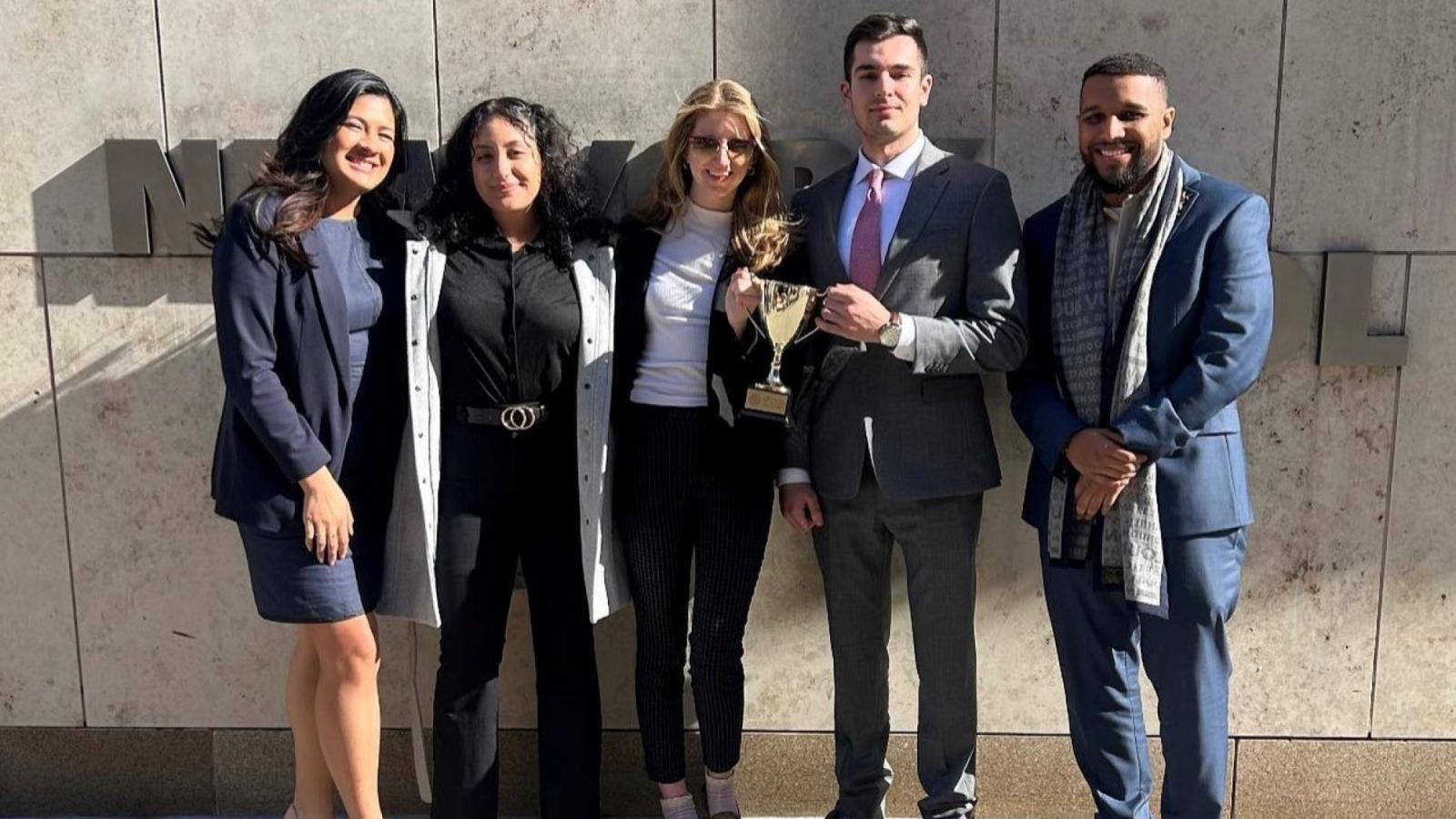
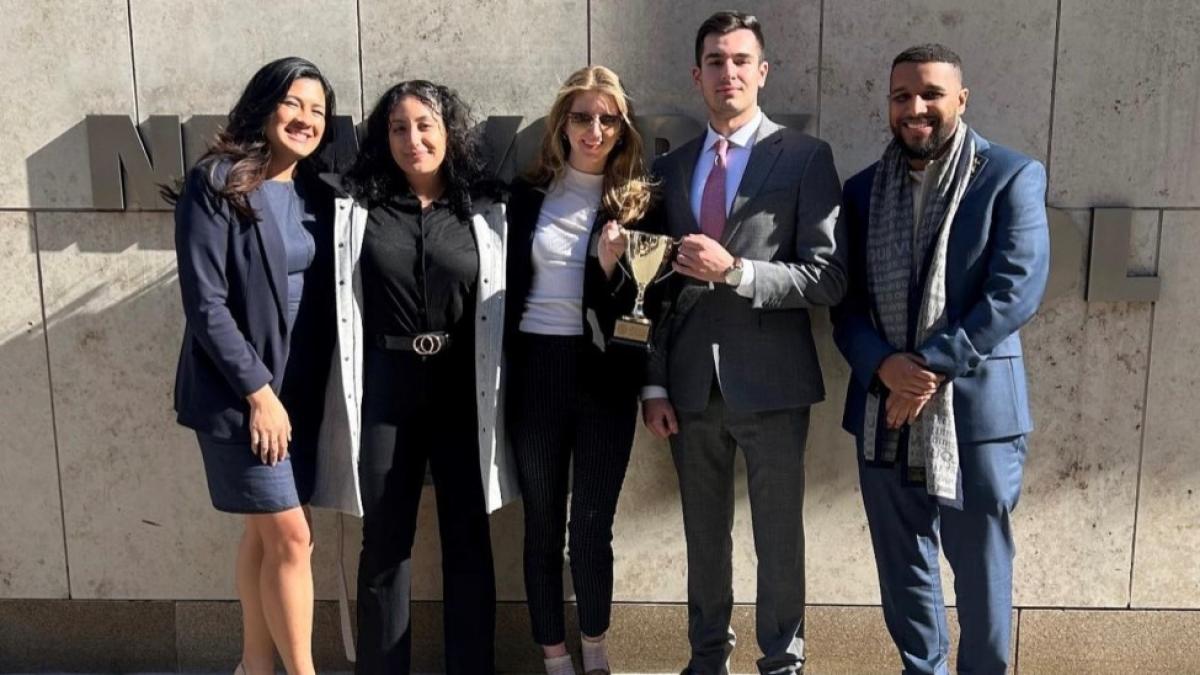
The Elisabeth Haub School of Law at Pace University’s top ranked trial advocacy program continues its track record of success with even more top finishes amongst fierce competition over the last week and weekend in February.
For the first time, Haub Law took home the championship at New York Law School’s third annual Soccer Negotiation Competition on February 23 and February 24, with a second Haub Law team finishing as semifinalists. Impressively, both Haub Law teams went undefeated in the preliminary rounds and advanced to the second day of the competition. From there, the Haub Law teams faced each other in the semifinals, each vying for a spot in the championship round. Ultimately, the team consisting of Marc Bisogno (2L) and Josie Buckley (3L) defeated the second Haub Law team consisting of Samantha Portillo (2L) and Nate Pinero (2L). With the second team finishing as semifinalists, Marc and Josie advanced to the finals ultimately defeating a strong Villanova Law team and finishing as champions. Both teams were expertly coached by first time coach and Haub Law’s first student coach ever, Andrea Garcia (4L).
A new addition to the Haub Law adjunct faculty, Dan Lust, a sports attorney, established the New York Law School’s Soccer Negotiation Competition three years ago. “When I started as a law student at Fordham, there was a baseball negotiation competition at Tulane Law School but there was no other similar competition for other sports anywhere in the country. I eventually made the decision to start a basketball negotiation competition at Fordham Law and, more recently as an adjunct professor at New York Law School, I established a soccer negotiation competition.” Serving as Director of the Competition and a Judge, Professor Lust recused himself for Pace students in this year’s competition but had high hopes for his new students. “This year’s competition was a hard-fought battle and an overall fierce competition that featured top tier schools and advocacy teams from across the country,” said Professor Lust. “Remarkably, Haub Law was not only the first non-Marquette school to win the competition but was also the first to have two teams make the final four.”
The Haub Law Advocacy Program had additional successes over the weekend. The Haub Law trial team won the invite only Shark Beach Showdown National Trial Competition. Liam Rattigan (3L), Chloe Devanny (3L0, Sabrina Rehfeld (3L), and Arianna Cruickshank (3L) alongside their coaches Nicolette Brusco, Samantha Tighe, and Jack Logan went undefeated amongst the top 24 trial advocacy programs in the country. The advocates moved through the preliminary rounds, quarter-finals, semi-finals, and ultimately the championship round where they won against the University of Georgia. To top off the success, Liam Rattigan took home the best overall advocate award. The competition was hosted by Nova Southeastern University.
Haub Law students Nicholas Kocaj, Julia Stueber, Tyler Justic, and Alexandra Tagliamonti had an incredible performance at the Online National Championship Mock Trial Competition, ultimately finishing in top 25%. Nicholas Kocaj and Alexandra Tagliamonti made it to the top 10 out of 50 teams. The students were supported throughout the competition by their dedicated coaches, Jared Hatcliffe, Dounea Elborji, and Marlene Geerinck. Julia Stueber was named best advocate of the competition as well.
Success was also had in the ABA Law Student Division National Appellate Advocacy Competition (NAAC), which took place at the Eastern District of NY Federal Courthouse in Brooklyn, NY. Haub Law students Stephanie Areford, Amanda Dinkin, Chelsea Paglia, and Roselby Jackson de la Torre participated on behalf of the Law School. Stephanie Areford and Amanda Dinkin won their NAAC regional rounds and advanced to the nationals. The team was coached by Brad Gorson ’13 and assisted by many others, who, along with the team, put in a tremendous amount of hard work and preparation. Amanda Dinkin, Roselby Jackson de la Torre, and Stephanie Areford were also recognized with awards for top ten best advocates. Stephanie and Amanda will compete against the top four teams from the region in the National Finals, which will be held in Philadelphia in April.
Over the weekend, the Elisabeth Haub School of Law at Pace University also hosted the 2024 ABA Representation in Mediation Competition, which is a mediation-style ADR competition. In addition to hosting the Competition, Haub Law students Olivia Paolillo and Luis Morales competed in it and were led by coach Nancy Montagnino. This regional competition was hosted and organized this year by Haub Law’s internal competition directors, Sarah Kissel, Maggie Minas, and Amanda Dinkin along with Director of Haub Law's Advocacy Programs and Professor of Practice in Advocacy, Louis Fasulo.
“Pace proud sums it up! The results this weekend are a tribute to the community effort here at the law school,” said Director of Haub Law’s Advocacy Programs and Professor of Practice in Advocacy, Louis Fasulo. “It is our most successful weekend ever. Our Advocacy Boards commitment, our student advocates, alumni mentors, and coaches hard work and tireless effort continue to enhance our National Reputation. Most importantly it exemplifies the valuable learning experience we are affording to our students. The number of Team Awards and individual recognitions including multiple best advocate awards have created great excitement. There is more to come.” Haub Law will celebrate the trial advocacy program, its students, alumni, and achievements at the biannual Gavel Gala to be held on April 11, 2024.